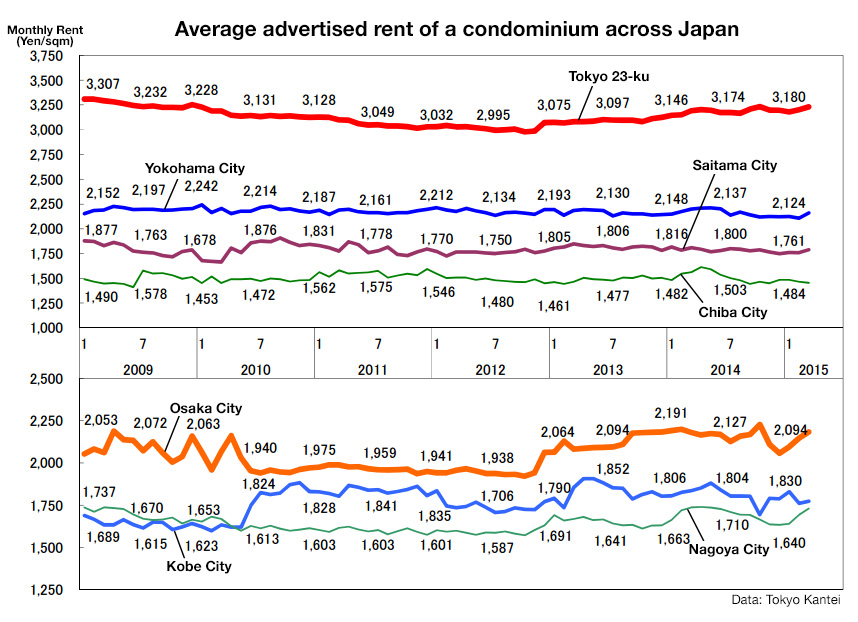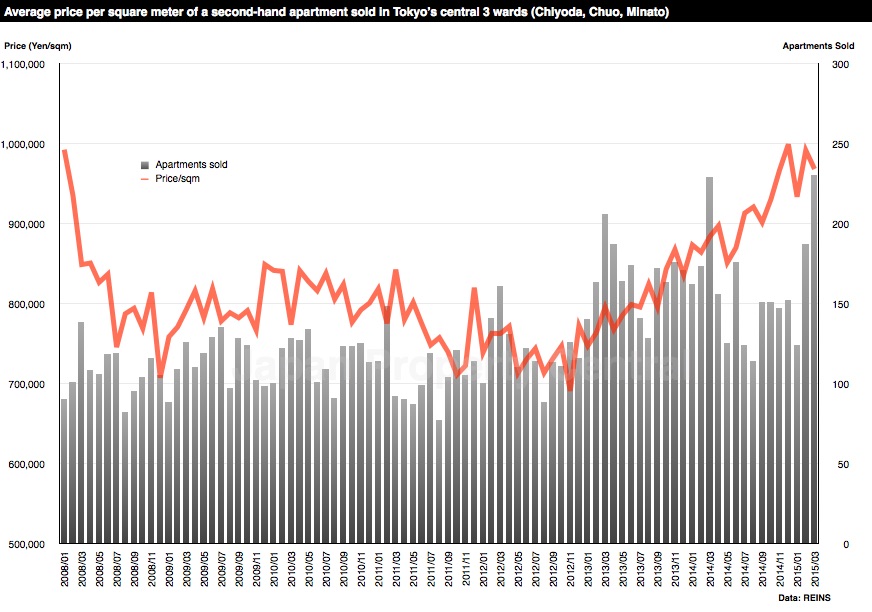New apartment supply still below 2014 levels
According to the Real Estate Economic Institute, 4,457 brand new apartments were released for sale in greater Tokyo in March, up 71.6% from the previous month but down 4.0% from last year. 3,550 apartments were sold, making the contract 79.6%, up 5.1 points from the previous month but down 0.2 points from last year.
The average new apartment price was 51,860,000 Yen, down 9.0% from the previous month and down 0.6% from last year. The average price per square meter was 736,000 Yen, down 9.4% from the previous month but up 0.8% from last year.
410 apartments in high-rise buildings (over 20 storeys) were offered for sale, down 60.3% from last year. The contract rate was 79.0%, up 10.3 points from last year.Read more
March 2015 rental data - Tokyo Kantei

According to Tokyo Kantei, the average monthly rent of a condominium in greater Tokyo was 2,613 Yen/sqm in March, down 0.5% from the previous month but up 0.5% from last year. The average apartment size was 59.77 sqm and the average building age was 18.8 years.
In the Tokyo metropolitan area, the average rent was 3,106 Yen/sqm, up 1.2% from the previous month and up 0.9% from last year. The average apartment size was 57.17 sqm and the average building age was 17.4 years.
Details of Akasaka’s 44-storey condominium announced

Details on Park Court Akasaka Hinokicho The Tower (previously the Akasaka 9 Chome Tower Project) have just been released. The 170m tall, 44-storey condominium, which was designed by Nikken and famed architect Kengo Kuma, is currently under construction on the northern side of Tokyo Midtown.
The high-rise will contain 322 apartments, of which just 163 (50%) will be available for sale. The remainder will go to landholders and participants of the development. The two and three-bedroom apartments will range in size from 57.61 ~ 203.96 sqm (620 ~ 2,195 sq ft). Layouts are cleverly designed and do not contain any windowless bedrooms that you may find in cheaper developments. The largest apartment, a 203 sqm penthouse, includes two full bathrooms, while the rest of the apartments have 1 bathroom.
Sales will begin in September October November 2015 . Prices have yet to be announced, but with apartments in other recent high-rises in Akasaka selling for around 2,000,000 Yen/sqm, it is likely that we will see comparative pricing in this new project. There have been rumours that apartments could be priced as high as 3,000,000 Yen/sqm.Read more
Meguro Station high-rise residential development draws huge interest

The large redevelopment on the eastern side of Meguro Station is garnering a large amount of attention with the sales office overwhelmed with inquiries. Tours of the sales showroom are now booked solid for the next two months. The sales office received 18,000 requests for property brochures, three times the number they had anticipated. Many of the inquiries were from prospective buyers in their 30s and 40s. A third of the inquiries were from residents in Shinagawa, Meguro and Minato-ku.
The model room opened in early April, and the first round of sales is scheduled to start in early June. Apartments will be offered for sale in stages, with almost 40% of the apartments being offered in the first round. Interested buyers will be required to submit applications during the sales periods, with lucky buyers selected via a lottery-type system.
The 80 billion Yen project includes two residential towers containing 940 apartments and a 27-storey office tower. Tokyo Tatemono, Daiichi Life Insurance, Taisei Kensetsu and Takenaka Corporation are the four developers.Read more
Transactions and luxury sales continue to soar in central Tokyo
According to REINS, 3,728 second-hand apartments were sold across greater Tokyo in March, up 13.2% from the previous month but down 6.7% from last year. This is the 12th month in a row to see a year-on-year decline.
The average apartment sale price was 29,230,000 Yen, down 0.1% from the previous month but up 9.7% from last year. The average price per square meter was 453,100 Yen, up 0.7% from the previous month and up 8.7% from last year. The average building age was 19.47 years.
1,843 second-hand apartments were sold in the Tokyo metropolitan area, up 17.2% from the previous month but down 7.1% from last year. The average sale price was 35,580,000 Yen, down 2.3% from the previous month but up 10.6% from last year. The average price per square meter was 601,900 Yen, down 0.7% from the previous month but up 11.1% from last year. The average building age was 18.58 years.
In central Tokyo’s 3 wards (Chiyoda, Chuo and Minato), 230 apartments were sold, up 23.0% from the previous month and up 0.4% from last year. This is the highest level for March seen since record keeping began in 2008.Read more
Residential yields in Minato-ku - April 2015

According to real estate listing site Homes, the average gross yield on an apartment in Minato-ku in April was 4.8%, down 0.2 points from the previous month and down 0.6 points from last year. The average gross yield across Tokyo was 6.6%, showing no change from the previous month but down 0.6 points from last year.
The average asking price of a second-hand apartment in Minato-ku was 878,943 Yen/sqm as of April 1, down 1.3% from the previous month but up 12.5% from last year. The average asking price for land was 1,206,363 Yen/sqm, down 3.2% from the previous month but up 6.4% from last year.Read more
Fast moving market in central Tokyo means some buyers are missing out
As we previously wrote about in May last year the property market in central Tokyo has indeed switched to a seller’s market.
In December 2014, the supply of secondhand apartments in Chiyoda, Chuo and Minato reached a record low. Compared to 2011, there are currently less than half the number of apartments on the market. Meanwhile, sales activity has increased with the number of transactions in 2014 up 47% from 2011. Transactions in February 2015 were up 50.8% from the previous month and up 8.1% from February 2014. This was the busiest February seen in the past five years.
The supply of new apartments is also shrinking, while prices in February reached a five year high. Future supply is also looking to be limited with growing construction costs, increasing land prices and a shortage of suitable development sites causing great stress for developers.
We are noticing that even the old stock is starting to be snapped up as buyers get desperate. January, February and March are typically the busiest months in the real estate industry, as companies scramble to make last minute sales or purchases by the end of the financial year, and people get settled in their new homes before the start of the school year.
Naturally the higher demand and lower supply is pushing prices upwards. We noticed an especially steep increase in prices from July ~ August 2014 onwards, with some sellers increasing their asking price while the property was still on the market.
What does this mean for you as a buyer?
First of all, your options have already halved from a few years ago. Depending on your requirements, you may not have a lot to choose from.
Secondly, you are now competing with more buyers thanks to recent changes to the inheritance tax system which has spurred investment from wealthy Japanese, and a weaker Yen which has added to the number of foreign buyers. These kind of buyers are typically cash buyers who are prepared to move fast to secure a property.Read more

